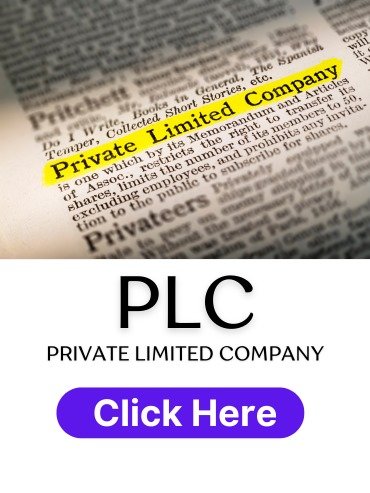Private Limited Company
Original price was: ₹25,000.00.₹10,000.00Current price is: ₹10,000.00.
Incorporation +2DSC + COB
Documents Required:
- KYC
- Contact Details
- Address Proof
- Business Name – 2 choices
*18% GST will be Applicable*
*All Government Fees Paid By Client*
*For better experience & guidance we recommend you to talk with our experts*
Description
Private Limited Company
A Private Limited Company, often abbreviated as Pvt. Ltd. is a type of business structure commonly used around the world, including in the United Kingdom, India, and many other countries. It is characterized by certain legal features that distinguish it from other types of business entities like sole proprietorships or partnerships.
Here is a detailed overview of a Private limited company:
1. Legal Definition and Formation:- A private limited company is a legal entity that is separate from its owners. It is formed by registering with the appropriate government authority according to the laws of the country where it operates. The process typically involves submitting the company’s memorandum and articles of association, along with other required documents, and obtaining a certificate of incorporation.
2. Limited Liability:- One of the key features of a private limited company is limited liability. This means that the liability of the shareholders (owners) is limited to the amount they have invested in the company. In case the company incurs debts or faces legal action, the personal assets of the shareholders are generally protected, except in cases of fraud or wrongful trading.
3. Ownership and Shareholders:- A private limited company is owned by its shareholders, who hold shares representing their ownership stake in the company. The shareholders elect a board of directors to manage the company on their behalf. Unlike public companies, private limited companies cannot offer shares to the general public and often have restrictions on the transfer of shares.
4. Management Structure:- The management of a private limited company is typically structured with a board of directors overseeing the company’s operations and making strategic decisions. The board appoints officers, such as a managing director or CEO, who are responsible for day-to-day management. The shareholders may also have the right to vote on certain matters affecting the company.
5. Financial Reporting and Compliance:- Private limited companies are required to comply with various legal and regulatory requirements related to financial reporting, taxation, and corporate governance. This includes preparing annual financial statements in accordance with accounting standards, filing tax returns, and holding annual general meetings of shareholders.
6. Privacy and Confidentiality:- As the name suggests, private limited companies enjoy a degree of privacy compared to public companies. They are not required to disclose as much information to the public, which can be advantageous for businesses that want to keep certain information confidential, such as financial performance or strategic plans.
7. Flexibility and Growth Potential:- Private limited companies offer flexibility in terms of ownership, management, and structure, making them suitable for small to medium-sized businesses in various industries. They also have the potential for growth and expansion, as they can raise capital by issuing additional shares or borrowing funds from banks and other financial institutions.
8. Dissolution and Winding Up:- A private limited company can be dissolved voluntarily by the shareholders or compulsorily by court order. The process of winding up involves settling the company’s debts, liquidating its assets, and distributing any remaining funds to the shareholders according to their respective ownership interests.
Overall, a private limited company provides a suitable business structure for entrepreneurs looking to establish a separate legal entity with limited liability, while still retaining control over the management and operations of their business.
10 FAQs About Private Limited Companies:
1. What is a Private Limited Company?
A Private Limited Company is a type of business entity that is privately held by a small group of individuals or shareholders. It is recognized as a separate legal entity, offering limited liability protection to its owners and allowing them to conduct business activities under the company’s name.
2. How many shareholders are required to form a Private Limited Company?
In most jurisdictions, including the UK and India, a Private Limited Company requires a minimum of two shareholders to be formed. However, there are also instances where a single individual can establish a Private Limited Company.
3. What are the benefits of forming a Private Limited Company?
Some of the key benefits include limited liability protection for shareholders, which means their personal assets are generally protected from the company’s debts and liabilities. Additionally, it offers greater credibility and trust among customers, suppliers, and financial institutions. It also facilitates easier transfer of ownership and continuity of the business.
4. How is a Private Limited Company governed?
A Private Limited Company is governed by its shareholders, who elect a board of directors to oversee the company’s operations. The board of directors, in turn, appoints officers to manage the day-to-day affairs of the company.
5. What are the compliance requirements for a Private Limited Company?
Private Limited Companies are subject to various compliance requirements, including annual filings, maintenance of statutory records, conducting annual general meetings, and adhering to tax regulations. Failure to comply with these requirements can result in penalties or even dissolution of the company.
6. Can a Private Limited Company raise funds from the public?
No, unlike a Public Limited Company, a Private Limited Company cannot raise funds from the public through the sale of shares on the stock exchange. However, it can raise capital from private investors, venture capitalists, or through bank loans and other financial instruments.
7. Is there a limit on the number of employees a Private Limited Company can hire?
No, there is no specific limit on the number of employees a Private Limited Company can hire. It can employ as many individuals as required to conduct its business operations effectively.
8. Can a Private Limited Company convert into a Public Limited Company?
Yes, subject to compliance with legal requirements and approval from regulatory authorities, a Private Limited Company can convert into a Public Limited Company by issuing shares to the public and meeting other criteria specified by the relevant laws and regulations.
9. Are the shareholders of a Private Limited Company liable for its debts?
Shareholders of a Private Limited Company enjoy limited liability, which means their liability is generally limited to the amount invested in the company’s shares. Their personal assets are protected from the company’s debts and obligations.
10. How can one dissolve a Private Limited Company?
A Private Limited Company can be dissolved voluntarily by passing a special resolution to wind up the company’s affairs. Additionally, it can be dissolved involuntarily by court order or due to non-compliance with legal requirements. The process of dissolution involves settling debts, liquidating assets, and deregistering the company with the relevant authorities.
For More Information : https://taxgyany.com/product/private-limited-company/





Laxmi –
Thank you Taxgyany team🥰